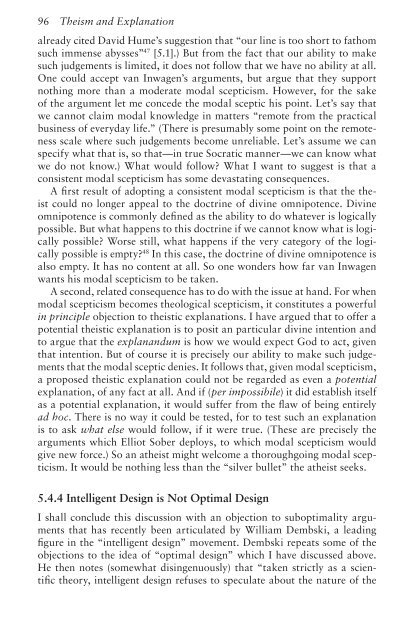Theism and Explanation - Appeared-to-Blogly
Theism and Explanation - Appeared-to-Blogly
Theism and Explanation - Appeared-to-Blogly
Create successful ePaper yourself
Turn your PDF publications into a flip-book with our unique Google optimized e-Paper software.
96 <strong>Theism</strong> <strong>and</strong> <strong>Explanation</strong><br />
already cited David Hume’s suggestion that “our line is <strong>to</strong>o short <strong>to</strong> fathom<br />
such immense abysses” 47 [5.1].) But from the fact that our ability <strong>to</strong> make<br />
such judgements is limited, it does not follow that we have no ability at all.<br />
One could accept van Inwagen’s arguments, but argue that they support<br />
nothing more than a moderate modal scepticism. However, for the sake<br />
of the argument let me concede the modal sceptic his point. Let’s say that<br />
we cannot claim modal knowledge in matters “remote from the practical<br />
business of everyday life.” (There is presumably some point on the remoteness<br />
scale where such judgements become unreliable. Let’s assume we can<br />
specify what that is, so that—in true Socratic manner—we can know what<br />
we do not know.) What would follow? What I want <strong>to</strong> suggest is that a<br />
consistent modal scepticism has some devastating consequences.<br />
A fi rst result of adopting a consistent modal scepticism is that the theist<br />
could no longer appeal <strong>to</strong> the doctrine of divine omnipotence. Divine<br />
omnipotence is commonly defi ned as the ability <strong>to</strong> do whatever is logically<br />
possible. But what happens <strong>to</strong> this doctrine if we cannot know what is logically<br />
possible? Worse still, what happens if the very category of the logically<br />
possible is empty? 48 In this case, the doctrine of divine omnipotence is<br />
also empty. It has no content at all. So one wonders how far van Inwagen<br />
wants his modal scepticism <strong>to</strong> be taken.<br />
A second, related consequence has <strong>to</strong> do with the issue at h<strong>and</strong>. For when<br />
modal scepticism becomes theological scepticism, it constitutes a powerful<br />
in principle objection <strong>to</strong> theistic explanations. I have argued that <strong>to</strong> offer a<br />
potential theistic explanation is <strong>to</strong> posit an particular divine intention <strong>and</strong><br />
<strong>to</strong> argue that the explanan dum is how we would expect God <strong>to</strong> act, given<br />
that intention. But of course it is precisely our ability <strong>to</strong> make such judgements<br />
that the modal sceptic denies. It follows that, given modal scepticism,<br />
a proposed theistic explanation could not be regarded as even a potential<br />
explanation, of any fact at all. And if (per impossibile) it did establish itself<br />
as a potential explanation, it would suffer from the fl aw of being entirely<br />
ad hoc. There is no way it could be tested, for <strong>to</strong> test such an explanation<br />
is <strong>to</strong> ask what else would follow, if it were true. (These are precisely the<br />
arguments which Elliot Sober deploys, <strong>to</strong> which modal scepticism would<br />
give new force.) So an atheist might welcome a thoroughgoing modal scepticism.<br />
It would be nothing less than the “silver bullet” the atheist seeks.<br />
5.4.4 Intelligent Design is Not Optimal Design<br />
I shall conclude this discussion with an objection <strong>to</strong> suboptimality arguments<br />
that has recently been articulated by William Dembski, a leading<br />
fi gure in the “intelligent design” movement. Dembski repeats some of the<br />
objections <strong>to</strong> the idea of “optimal design” which I have discussed above.<br />
He then notes (somewhat disingenuously) that “taken strictly as a scientifi<br />
c theory, intelligent design refuses <strong>to</strong> speculate about the nature of the



